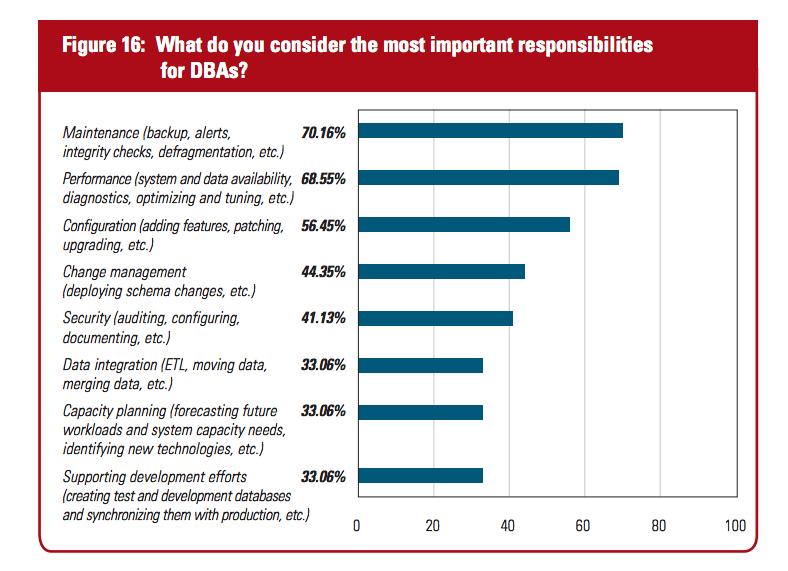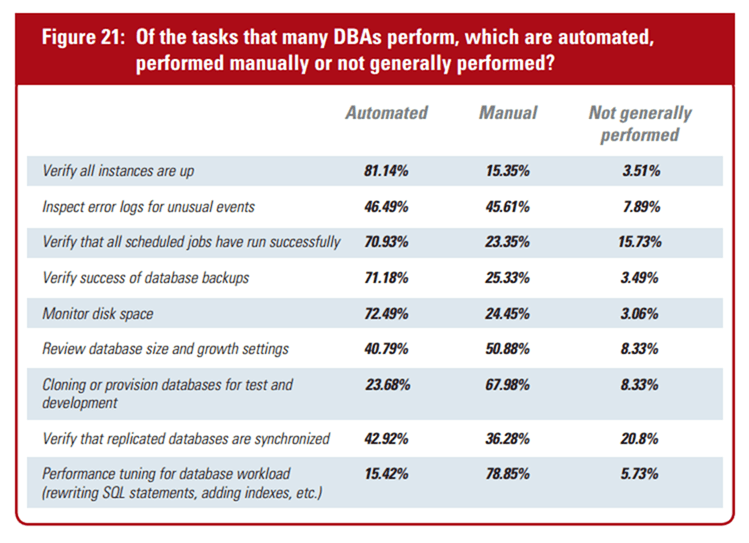How DBAs Should Be Evolving With Database Automation
As DBAs are saddled with more duties and responsibilities, it can be a strain to handle them manually. See where automation can make your life easier.
Join the DZone community and get the full member experience.
Join For FreeThe job of the DBA has always been a quite complex one that includes many responsibilities. However, as organizations evolve with the times, the role of DBA is becoming more and more challenging — and including an increasing number of tasks. It is clear that DBAs must do whatever they can in order to simplify their ever-growing workload.
In a recent Dell survey, by Research Analyst, Elliot King, and produced by Unisphere Research, DBAs were asked a number of questions pertaining to database administration and the importance of database automation. Check out the graph below to see what they considered to be the most important responsibilities for DBAs.
Based on this survey, it is clear that maintenance, performance, and configuration are key aspects of being a DBA. But large percentages also included other tasks, like change management and security counting among the most important responsibilities. Because the truth is that the role of a DBA holds many responsibilities.
For this reason, as DBA, it is important to simplify whatever you can in order to better be able to perform all your essential tasks. One of the ways DBAs are doing this is by using database automation.
As you can see, many of the basic administrative tasks of an organization are now automated. When it comes to verifying that all the database instances are up and running, over 80% of the people who responded to this survey disclosed that they use automation. Likewise, over 70% of DBAs use automation for verifying that scheduled jobs ran successfully, for verifying that database backups were successful, and to monitor disk space.
On the other hand, some tasks are clearly more commonly performed manually, like performance tuning, which 78.85% of DBAs perform manually, and provisioning or cloning databases, which 67.98% DBAs perform manually. This makes sense according to earlier studies that have shown that these tasks are more difficult and require more attention from DBAs.
When discussing the most pressing matters for the coming year, many DBAs mentioned that they would like to automate more tasks associated with database administration. The survey did not glean which specific project or project areas DBAs would like to automate, but that is likely due to the fact that one of the most challenging aspects of database administration is that each setting is unique.
In terms of data management infrastructure, DBAs were also asked to say what they thought the top challenges facing DBAs will be over the next few years, to which 38.86% picked the automation of more tasks associated with database management.
DBAs are responsible for so much and are continuously being asked to manage more database instances and DBMSs from different platforms, all while the amount of data under management continues to grow at a steady pace. Yet, while some routine administrative tasks have been automated, many tasks, like performance tuning and provisioning, are still generally done manually. For this reason, it is crucial for DBAs to continue to learn new technologies and continue to find ways to automate as much as possible.
Published at DZone with permission of Yaniv Yehuda, DZone MVB. See the original article here.
Opinions expressed by DZone contributors are their own.



Comments